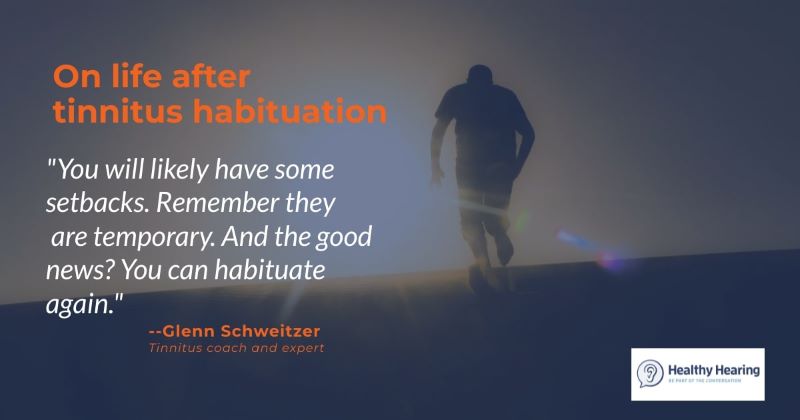Find another clinic near 93726.
|
www.HealthyHearing.com |
What to expect after tinnitus habituationOnce you can tune out the sound, a new chapter begins
Contributed by Glenn Schweitzer Despite what you may have heard about tinnitus, there are many coping techniques to find relief from tinnitus in the short term, and thanks to a mental process called habituation, you can get to a place where it stops bothering you entirely, where your brain just tunes it out like it does all other meaningless background noise. Yet, because tinnitus itself is poorly understood by the medical community, there are a lot of misconceptions about habituation as a strategy for lasting tinnitus relief. 
I've already explored why you may want to try habituation for tinnitus and what may be standing in your way. For those of you ready to get started now—or who have already begun the process—I’m going to explore what it feels like to habituate, the various stages of relief you will likely experience along the way, and the realities of life after achieving successful tinnitus habituation. Habituation is not a cure for tinnitusBut first, it’s important to understand that successful habituation is not the same thing as a cure for tinnitus. There is no finish line to cross where you will suddenly never hear your tinnitus again. It also isn’t a strategy that delivers immediate relief in the middle of a difficult moment of suffering. Lasting relief from tinnitus is entirely possible, and you can restore your quality of life to what it was before, but you also need to understand that habituation is a process where success occurs over time.
When a tinnitus sufferer actively works to habituate using one of several possible strategies, relief isn’t instantaneous. It’s not a linear progression either, where every day is a little bit better than the day before. It often feels like taking three steps forward, two steps back, over and over again, which can be endlessly frustrating. It’s especially challenging to experience a bad spike or setback after noticeable improvement has been made. But it also offers a degree of hope because the inevitable bad days and difficult moments you will encounter are simply an unavoidable and normal. With that in mind, let’s take a closer look at the habituation process itself and what you can expect to experience in terms of relief along the way. The stages of habituation(Disclaimer: The following is not based on an official or scientific understanding of habituation, but observations of my own experience, and patterns I’ve observed working 1-on-1 with more than 1,000 other tinnitus sufferers around the world. Your own experience may vary.) For the purpose of this explanation, let’s look at the typical progression of a person experiencing the worst possible case of suffering – extremely loud, intrusive, and bothersome tinnitus that is causing severe anxiety, panic, and emotional reaction, all day long. First sign of progress: The first sign of progress most sufferers experience is when they cross what I refer to as the crisis point. At this point, a sufferer has reduced the negative reaction enough to simply no longer feel that they are in a constant, 24-7 state of crisis. It’s still very difficult to cope at this point, but it also accounts for the first noticeable improvement in quality of life. Stage 1: At the first stage of habituation, a sufferer likely still hears the sound of their tinnitus on a constant basis, and it still may seem very loud, but it stops affecting them so severely on an emotional level. Overall anxiety levels start to improve, and the sound becomes less intrusive and more easily tolerated throughout the day. Quality of life improves, but relief is not constant at this stage. Tinnitus spikes are still challenging and potentially frequent, and most people are still having more bad days and moments than good days and moments, though both the bad and good days have improved somewhat. Stage 2: The emotional response has improved further and now the brain can now effectively tune it out a much larger percent of the time. The sound is still there, but because anxiety levels and the emotional response have improved further, it can start to feel much quieter, or at the very least, less intrusive. At this stage, one can expect to have more good days than bad, and while spikes still occur, they are not nearly as problematic and much easier to manage. Stage 3: Stage three offers the greatest possible level of relief that a sufferer can achieve through habituation. At this point, your tinnitus no longer bothers you at all and your brain will effectively tune out the sound automatically, the vast majority of the time. When you do notice it, it no longer affects you, and any potential spikes are very easily managed. Quality of life is restored to pre-tinnitus levels, and for most people, the volume of their tinnitus will seem diminished. Considerations for life after habituation
remember they are temporary. Once you successfully habituate, you will likely still notice your tinnitus from time to time, especially in quiet environments. The difference is, you will no longer react to it emotionally, psychologically or physiologically. So when this occasionally happens, you likely won’t pay attention to it for very long. It’s kind of like noticing that your air conditioner just turned on–you hear it for a second, and then just go back to whatever it was you were doing. When you simply notice the sound of your tinnitus, but nothing negative happens as a result, your attention can sort of bounce off of it without difficulty. Spikes and difficult moments are always still possible though after you habituate successfully. A plan or strategy is importantAt some point, you will likely encounter loud sounds you didn’t expect or traumatic experiences you weren’t prepared for. Life happens, so having a plan or strategy in place for the long term is important. The best advice I can give, should you encounter a difficult moment down the road, is to go back to the coping tools, techniques, and strategies that helped you habituate in the first place, that you no longer need or use on a regular basis. Never hesitate to go back to the basics. The sooner you can act, from the moment the spike begins, the better chance you will have of calming yourself down and preventing fight or flight from escalating further. The good news is that if the vicious cycle ever does ramp back up, you can habituate again. And it’s usually much faster the second time around, because you’ll know it’s possible and exactly what to do about it. More: Preventing tinnitus relapse: Strategies for long-term relief Final thoughtsI know that I did not actually explain any specific strategy for tinnitus habituation in this post. I’ve previously covered effective strategies that can work well, including the one that enabled me to habituate very quickly. But hopefully I’ve at least cleared up some of the confusion you may have had about the process itself. Glenn Schweitzer
Related Help Pages:
Tinnitus (ringing in the ears) Treatment
|
Featured clinics near me
Earzlink Hearing Care - Reynoldsburg
7668 Slate Ridge Blvd
Reynoldsburg, OH 43068

Find a clinic
We have more hearing clinic reviews than any other site!



 Glenn Schweitzer is an entrepreneur, blogger, and the author of Rewiring Tinnitus and Mind over Meniere’s. He is passionate about helping others who suffer from tinnitus and vestibular disorders and volunteers as an Ambassador Board Member for the Vestibular Disorders Association (VEDA). Through his blogs, he continues to raise awareness for tinnitus, Meniere’s disease, and other vestibular disorders, spreading his message of hope to those in need.
Glenn Schweitzer is an entrepreneur, blogger, and the author of Rewiring Tinnitus and Mind over Meniere’s. He is passionate about helping others who suffer from tinnitus and vestibular disorders and volunteers as an Ambassador Board Member for the Vestibular Disorders Association (VEDA). Through his blogs, he continues to raise awareness for tinnitus, Meniere’s disease, and other vestibular disorders, spreading his message of hope to those in need.